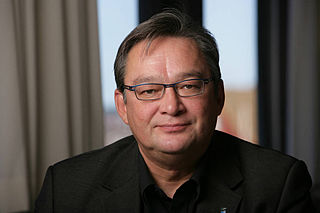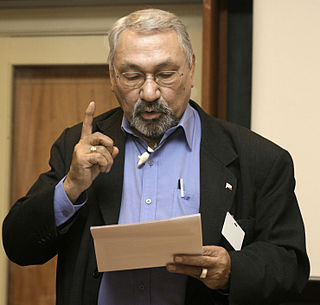The politics of Greenland, a "constituent country" of the Kingdom of Denmark, function in a framework of a parliamentary representative democratic dependency, whereby the prime minister is the head of government, and of a multi-party system. Executive power is exercised by the government. Legislative power is vested in both the government and parliament Inatsisartut. The judiciary is independent of the executive and the legislature. Greenland has full autonomy on most matters, except on policies and decisions affecting the region including negotiations with the devolved legislatures and the Folketing.
Siumut is a social-democratic political party in Greenland. The party was an observer affiliate of the Socialist International. Siumut is led by the current Greenlandic Premier Kim Kielsen. Until September 2014 it was led by Aleqa Hammond, who was the first woman to lead the party.

The Inatsisartut, also known as the Parliament of Greenland in English, is the unicameral parliament of Greenland, a autonomous country in the Danish realm. Established in 1979, it meets in Inatsisartut, on the islet of Nuuk Center in central Nuuk.
The Democrats is a liberal and unionist political party in Greenland.
The Naalakkersuisut is the government of Greenland, a "constituent country" of the Kingdom of Denmark, takes place in a framework of a parliamentary representative democratic country, whereby the prime minister is the head of government, and of a multi-party system. Executive power is exercised by the government. Legislative power is vested in both the government and parliament Inatsisartut. The judiciary is independent of the executive and the legislature. Greenland has full autonomy on most matters, except on policies and decisions affecting the region including negotiations with the devolved legislatures and the Folketing.
The Labour Party was a short-lived leftist political party in Greenland. The party was founded in early 1979 as the political wing of the Sulinermik Inuussutissarsiuteqartut Kattuffiat (SIK) trade union centre. SIK had previously supported Siumut, but that cooperation had been terminated in the fall of 1978.

Greenlandic independence is a political ambition of some political parties, advocacy groups, and individuals of Greenland, an autonomous country of the Kingdom of Denmark, to become an independent sovereign state.
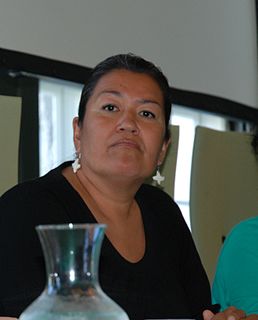
General elections were held in Greenland on 12 March 2013. The opposition Siumut party emerged as the largest in Parliament, winning 14 of the 31 seats. On 26 March Siumut leader Aleqa Hammond became Greenland's first female Prime Minister.
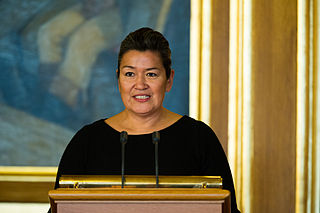
Aleqa Hammond is a Greenlandic politician and member of the Danish Folketing (parliament). Formerly the leader of the Siumut party, she became Greenland's first female Prime Minister after her party emerged as the largest parliamentary faction in the 2013 elections. In 2014 she stepped down as Prime Minister and leader of Siumut, following a case of misuse of public funds. She was expelled from Siumut on 23 August 2016 after yet another case of misuse of public funds and became an independent. On 31 March 2018 she announced that she is running in the 2018 Greenlandic parliamentary election for the Siumut breakaway Nunatta Qitornai.
The Inuit Party was a separatist party in Greenland, formed by dissidents from the then-governing Inuit Ataqatigiit (IA). The party was opposed to the so-called big-scale law, and wanted a referendum on the law. Mette Lynge represented the party in the Naalakkersuisut (Government) and was minister for dwellings, nature and environment. At the 2014 Greenlandic general election the party did not win any seats in parliament.
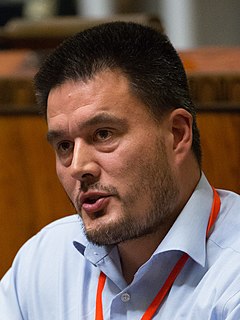
Early general elections were held in Greenland on 28 November 2014. They were called after Prime Minister Aleqa Hammond resigned following a spending scandal. Siumut and Inuit Ataqatigiit emerged as the largest parties both winning 11 of the 31 seats. A three party coalition government was formed consisting of the incumbent Siumut and Solidarity parties alongside the Democrats.

Partii Naleraq is a centrist-populist political party in Greenland.

Atassut is a liberal-conservative and unionist political party in Greenland. Founded on 29 April 1978, Atassut is an established partner of the Liberal Party of Denmark.
General elections were held in Greenland on 24 April 2018, electing all 31 members of Parliament. The elections were required to be held no later than 26 November 2018, four years after the previous elections on 27 November 2014, but Prime Minister Kim Kielsen chose to call the elections seven months early. His Siumut party remained the largest in Parliament, but lost two seats, whilst Inuit Ataqatigiit, the second-largest party, lost three seats. The smaller Democrats and Partii Naleraq gained seats, with the newly formed Cooperation Party and Nunatta Qitornai parties both entering Parliament.
The Third Cabinet of Kim Kielsen is the incumbent Government of Greenland, in office since 27 October 2016. It is a coalition majority government consisting of Siumut, Inuit Ataqatigiit and Partii Naleraq.






